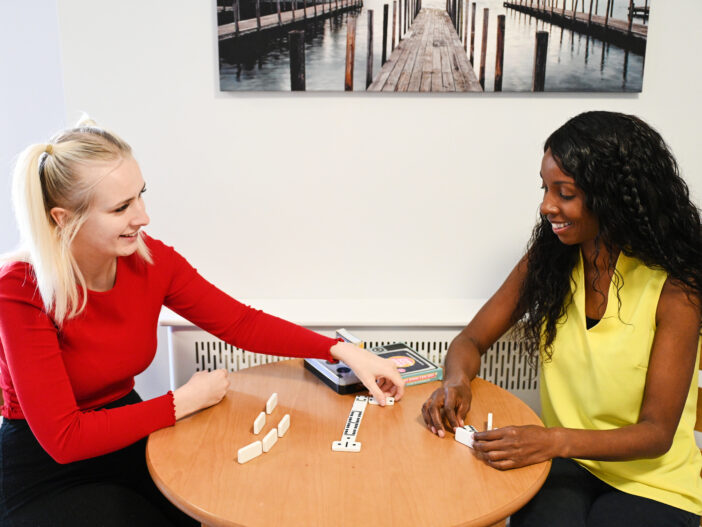Living with a brain injury during a global pandemic
By Louise Houghton, Placement Manager at Voyage Care
I have worked in Brain Injury Rehabilitation Services and community health services for almost 17 years. I am currently the brain injury rehabilitation Placements Manager at Voyage Care, which I have been enjoying since leaving my role as service manager at one of our brain injury services eight years ago.
Our brain injury services services offer a 12-week assessment period with the option of extending placements to meet rehabilitation goals for up to two years. We offer a unique, socially led rehab continuum that focuses on community based, functional rehab.
During the 12-week assessment period we aim to undertake assessments relating to all aspects of daily living. This includes things like morning and evening routines, meal preparation, budgeting, shopping, social and conversational skills, road safety, community orientation, domestic tasks and maintaining relationships. At the end of the 12-week period we can then set goals in the areas that require improvement and work towards suitable discharge planning. This type of placement requires an Inter-Disciplinary Team (IDT) approach. To take this approach, it requires a lot of internal and external appointments, assessments and meetings with several different people and locations to ensure success of the assessment period.
In March 2020, the rumours of global lockdowns became a reality and the government imposed a national lockdown in England which impacted all our brain injury rehabilitation services. This meant we were no longer able to allow visitors into our services, the people we supported were no longer able to freely access the community for rehab and social purposes. Our main priority became keeping all the people we support safe from COVID-19.
The people we support in our brain injury services had their therapy input and goals paused immediately, whilst we thought of a new and safe way of working. This thorough and concise planning took time to implement which meant in the interim, the people we support were at a standstill on their journey. This was a confusing and difficult time for the people we support and our staff teams. For many of the people we support, daily routine is critical for their mental health. Their daily routine may consist of waking up and being supported to go out with their therapist or support worker to purchase fresh ingredients for their lunch. This routine is what often motivates individuals to get out of bed each day as it fills the day with meaningful activity. As we went into lockdown, this routine was no longer doable. People we support were at high risk and access to shops and unnecessary trips out were restricted. Individuals found it difficult to understand new government guidelines and when they did, some struggled to retain this information.
The impact the restrictions had on the people we support was astonishing and not only affected their mood, but we also saw an increase in difficult behaviour. Physical abilities were also affected during lockdowns. Physiotherapy is a huge part of the rehabilitation journey, often walking to the shop was a great functional way for someone to undertake physiotherapy goals without actually realising they are engaging in therapy.
Once we had time to digest the new restrictions and how they impacted our services, we were able to work flexibly and creatively to help reduce the impact this had on the people we support. As our main priority was keeping everyone safe, we decided that visits from our therapy team would only be deemed essential if remote therapy or no therapy input would be detrimental to their health and wellbeing. This is when we began to implement virtual therapy sessions, often done using a tablet.
Most of the people we support have been able to engage this way. Each service has an in-house therapy coordinator who supported the remote therapy, they were included in the sessions to ensure the individuals got the most from it, had their input and understood everything being discussed. Where this has not been possible due to technology restrictions or someone’s engagement in virtual sessions, we have continued with face to face sessions but following careful measures. This included, a risk assessment, personal protective equipment (PPE), testing and safe distancing to ensure reduced exposure to other people.
Each individual service is classed as one household/bubble, this meant that the people we support were able to continue to be around other residents – and not necessarily as isolated as the rest of the population. With this, we have found new friendships blossoming as they have spent more time inside socialising instead of being out and about or with their own friends and family. Our services have been going above and beyond to keep things as ‘normal’ as possible, including throwing lots of in-house themed parties, playing in the garden, having movie nights and much more. As restrictions are lifting things are increasingly getting back to normal and being able to have two named indoor visitors (excluding children) has been a much-welcomed relaxation to the rules!
We’re keeping you safe at Voyage Care
We remain focused on adhering to all the latest government guidance and advice relating to the global spread of COVID-19 (Coronavirus). The health and wellbeing of the people we support, and our staff teams remains our highest priority. To learn more about what we are doing, visit our COVID-19 (Coronavirus) resource area.
If you would like to find out more about our brain injury rehabilitation support, please complete our quick and easy form and a member of our friendly team will be in touch.

 News & events
News & events 

